$5 Million Grant Program for Security at Houses of Worship on State Bond Commission Agenda

Audio By Carbonatix

State Sen. Derek Slap (D-West Hartford) speaks at a press conference at Congregation Beth Israel regarding security grants for houses of worship and nonprofits on Dec. 14, 2023. Photo credit: Ronni Newton
Legislators and other leaders announced a $5 million grant program for security at houses of worship and nonprofits at a press conference in West Hartford on Thursday.
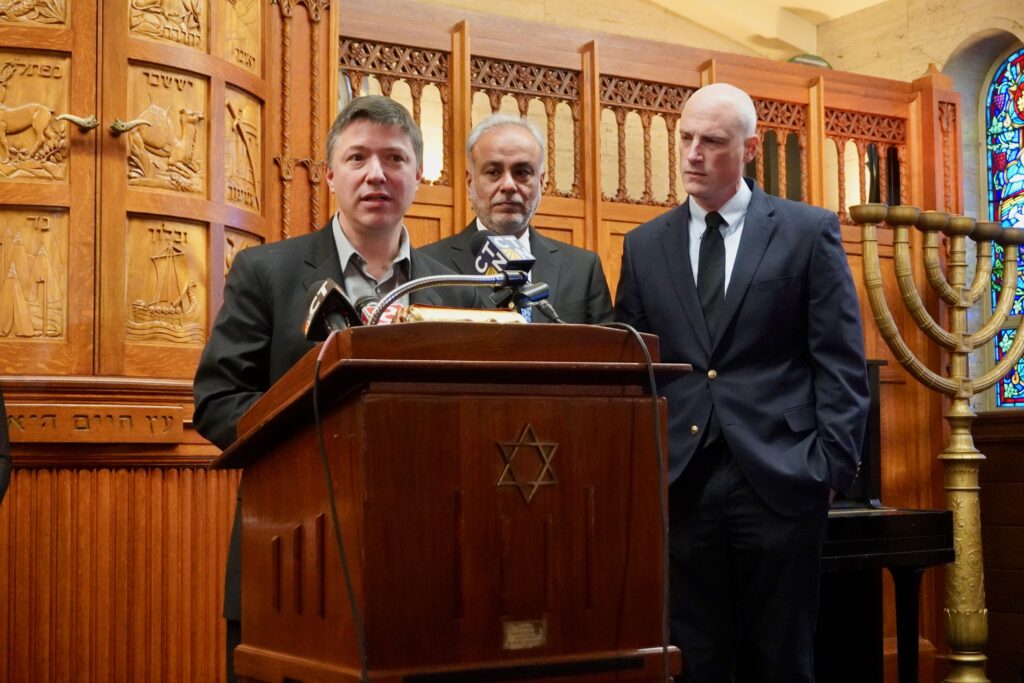
Rabbi Michael Pincus of Congregation Beth Israel speaks at a press conference at regarding security grants for houses of worship and nonprofits on Dec. 14, 2023. Photo credit: Ronni Newton
By Ronni Newton
The State Bond Commission will meet on Friday, Dec. 15, and among the agenda items expected to be approved is $5 million in funds for a grant program to assist with security improvements at houses of worship and nonprofits that are at heightened risk of being targets for hate crime.
At a press conference Thursday at Congregation Beth Israel in West Hartford, State Sen. Derek Slap (D-West Hartford) said it’s important for houses of worship and nonprofits to know that the funds will be available Friday, and they can apply immediately.
The legislature had previously approved $10 million for security grants, but it’s been about a year since additional funding was authorized. Thus far, about 100 of the 200 institutions that had applied received the grants.
Under the latest grant program, each institution is eligible for up to $50,000, and the grants will be evaluated and dispersed through the Department of Emergency Services and Public Protection (DESPP). Additional federal funding is likely forthcoming in the next few months, Slap said.
“It’s heartbreaking that we have to think about this, that we’re here today announcing security funding in order to ensure that people who are going to their houses of worship to pray feel safe, but that’s the world that we live in today,” said Slap, who along with state Sen. Said Anwar (South Windsor) introduced the original bill in 2019 – a bipartisan and bicameral effort that created the grant program.
“These funds are going to make a real difference,” Slap said.
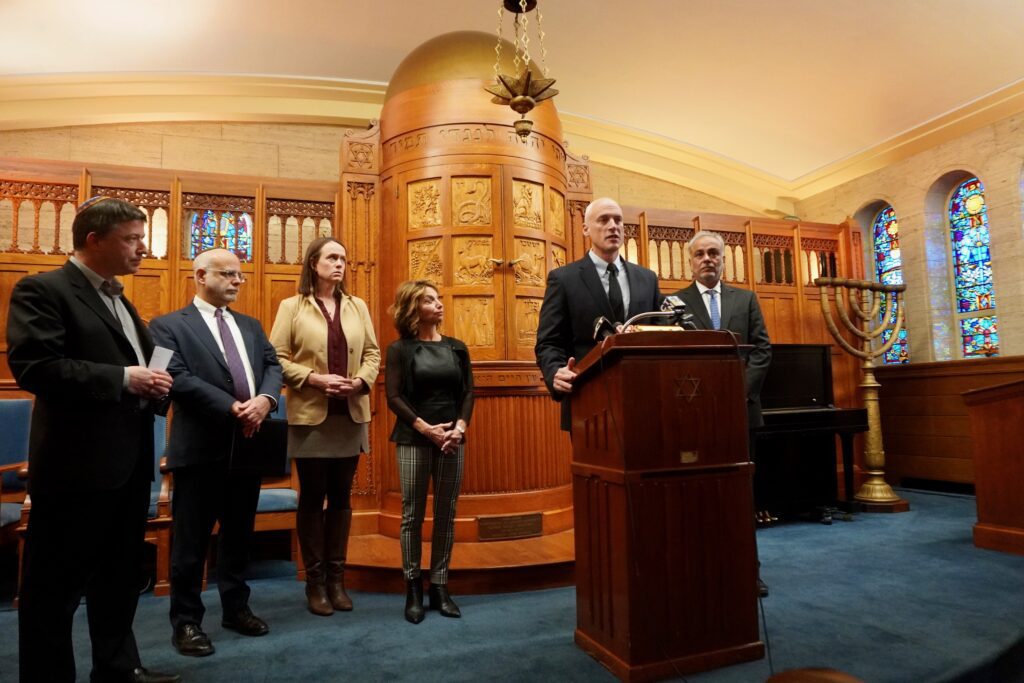
State Sen. Derek Slap and other officials speak at a press conference at Congregation Beth Israel regarding security grants for houses of worship and nonprofits on Dec. 14, 2023. Photo credit: Ronni Newton
“Tonight we light the last night of Hanukkah, the eighth candle, and we celebrate a story that’s over 2,000 years old, a story that still goes on today, a story about freedom and safety, and security,” said Rabbi Michael Pincus of Congregation Beth Israel. “In some ways it’s sad that this is happening and in so many ways we’re grateful for our state government doing all they can to make our houses of worship safe.”
He said he hoped the funds will help everyone feel safe going to their houses of worship.
“The fundamental right of everyone to be able to worship in peace and safety is really important to our community,” said West Hartford Mayor Shari Cantor. “We’re a diverse community and we value the quality of life and the importance of people feeling safe throughout our community, and this money, this actual commitment by the state to help all religious institutions and actually businesses that are housed in religious institutions, to feel safe.”
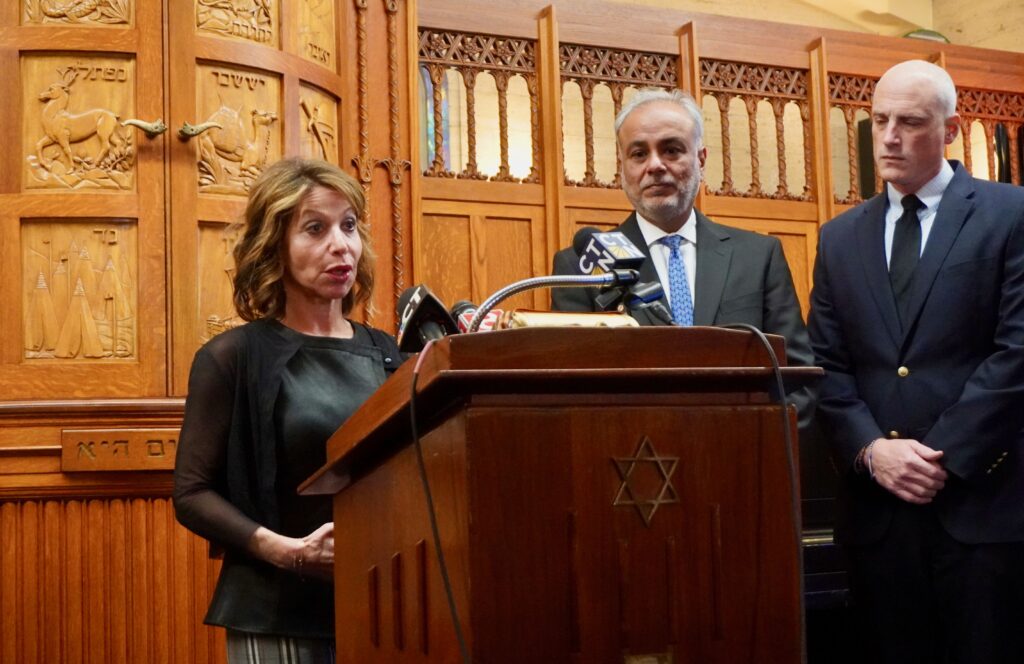
West Hartford Mayor Shari Cantor speaks at a press conference at Congregation Beth Israel regarding security grants for houses of worship and nonprofits on Dec. 14, 2023. Photo credit: Ronni Newton
The threats are real, Cantor said, “and it’s really important that we provide all the tools necessary to keep every person that walks into a religious institution safe.” She said she had hoped the initial grant program in 2019 would be enough, but it’s not.
The date of the press conference, Dec. 14, is the anniversary of the tragic murder of children in Sandy Hook, Anwar said. “Our state was attacked … our children were murdered, and our state actually became one of the first that had a grant program to protect schools.” In that same mindset, he said, Connecticut is one of the first few states to become a partner and fund a program to support safety measures at places of worship.
“No one, in any part of the state of Connecticut, praying in any way shape or form to their beloved, should have to worry about their safety, and that is why we are all united in one voice,” Anwar said, “to say we need that protection.”
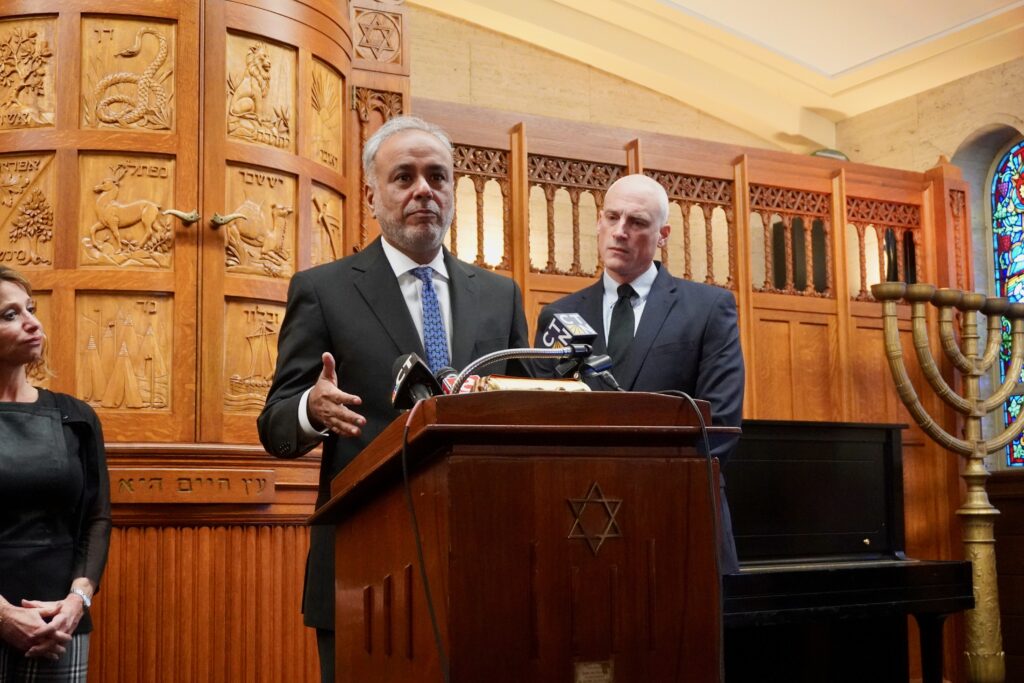
State Sen. Saud Anwar (D-South Windsor) speaks at a press conference at Congregation Beth Israel regarding security grants for houses of worship and nonprofits on Dec. 14, 2023. Photo credit: Ronni Newton
The funds continue to be needed, he said, noting that hate crimes and hate speech has been on the rise targeting the Jewish community as well as the Muslim and other communities. He thanked Gov. Ned Lamont for being at the forefront and making sure “that all people in our state feel comfortable where they are, and how they connect with their beloved.”
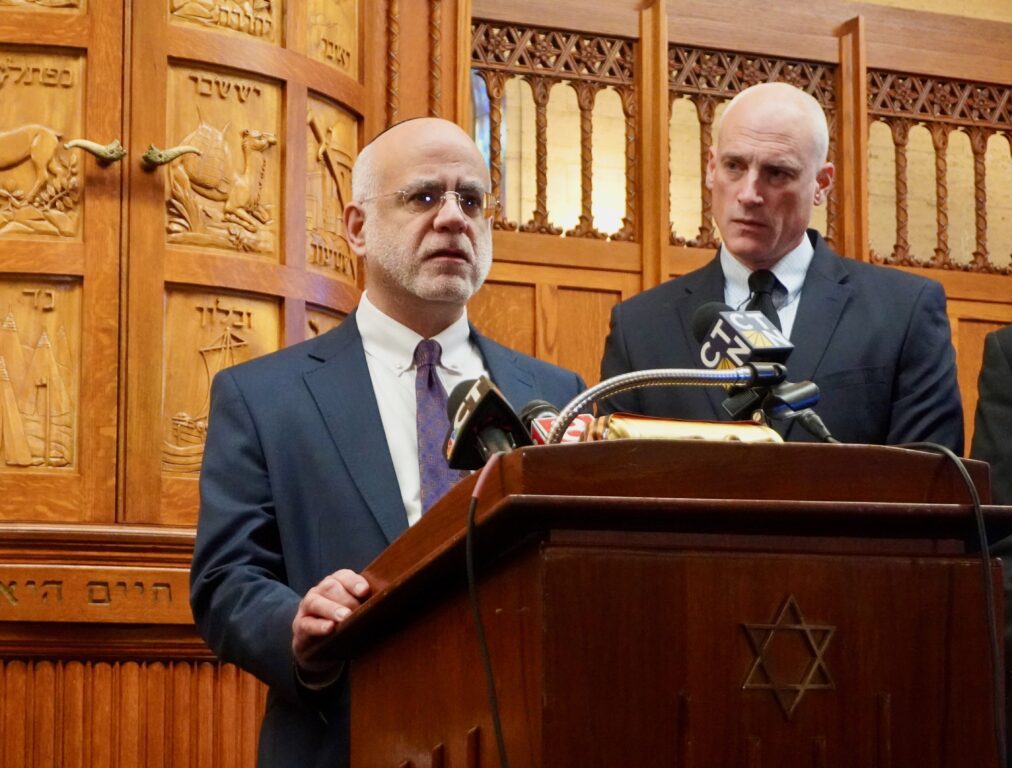
David Waren, president and CEO of the Jewish Federation of Greater Hartford, speaks at a press conference at Congregation Beth Israel regarding security grants for houses of worship and nonprofits on Dec. 14, 2023. Photo credit: Ronni Newton
David Waren, president and CEO of the Jewish Federation of Greater Hartford, said just over five years ago there were hundreds who attended a vigil at Congregation Beth Israel following the Tree of Life shooting in Pittsburgh. “That wasn’t a one-off,” he said, but was followed by violent attacks in Poway, Jersey City, Monsey, and incidents of antisemitism are up more than 400% according to the ADL. There have also been vicious anti-Muslim incidents, as well as targeting of Black churches, Sikh temples, and others.
“After that shooting five years ago we launched a comprehensive security initiative across the region, on the belief that the most important thing we could do was make sure people were safe engaging in religious life,” Waren said. “If we can’t do that, all of the rest is meaningless.”
Site assessments of security needs have indicated that mosques, churches, and synagogues just don’t have the resources in many cases to implement even minimal safety measures, said Waren. “So this funding is critical in aligning those assessments and the assessments of vulnerabilities to make sure people are safe and safeguarded.”
While there’s no single answer, Waren said, “for me it always came down to laws, leadership, and education … and the most important factor is leadership.” In Connecticut, he said, officials have been tremendous allies and leaders and are providing the most amount of security grant funding per capita. “Connecticut is literally the leader in the country and the leaders are here today.”
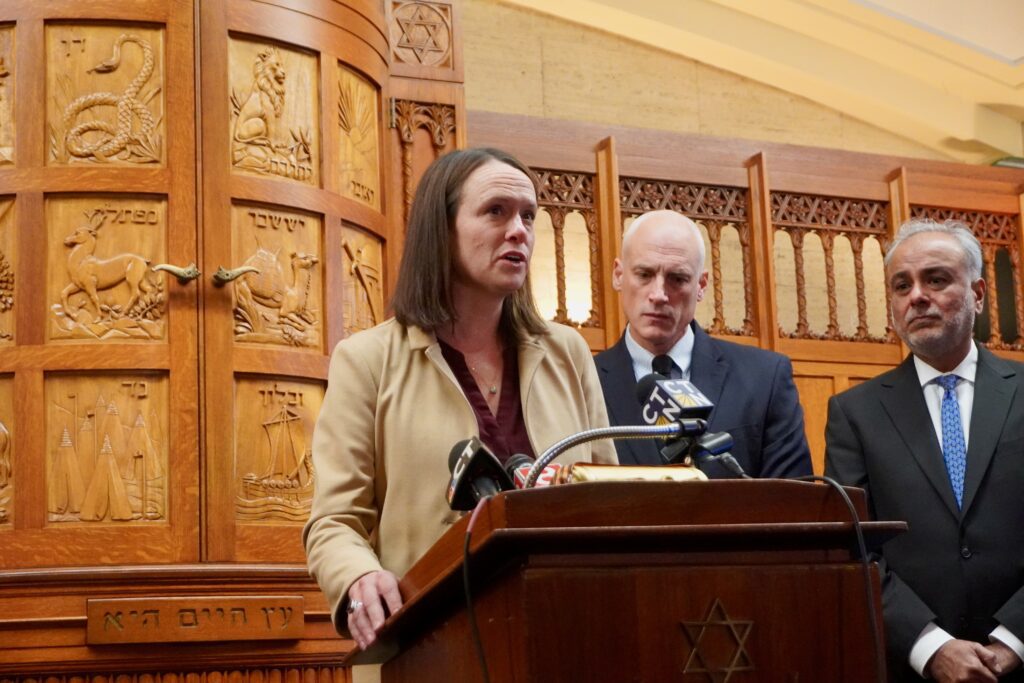
State Rep. Jillian Gilchrest (D-West Hartford) speaks at a press conference at Congregation Beth Israel regarding security grants for houses of worship and nonprofits on Dec. 14, 2023. Photo credit: Ronni Newton
State Rep. Jillian Gilchrest (D-West Hartford) said no one should ever be afraid going to their houses of worship and she is glad the funding also extends to nonprofits like Jewish community centers, which serve many people.
“The other piece of this is that a house of worship or a faith-based community isn’t just for those in that faith,” she said. “We gather together as a community in these places that come under attack because of the religion they’re associated with, and so we want to ensure when people are going to their house of worship they’re protected but also that everyone who is participating in a faith community, either directly or indirectly, is protected.”
State Sen. Matt Lesser (D-Middletown) also attended the press conference, and said “this is a very difficult time to be a religious minority in this country.”
Threats and the upsurge in hate doesn’t apply just to one group, he said, “but to religious minorities in general.”
He agreed with Gilchrest about the importance of not just providing assistance to places of worship but also to community centers.”We have to do our part as leaders to make sure everyone feels safe in this state and in this country,” and to send a message to hate groups.
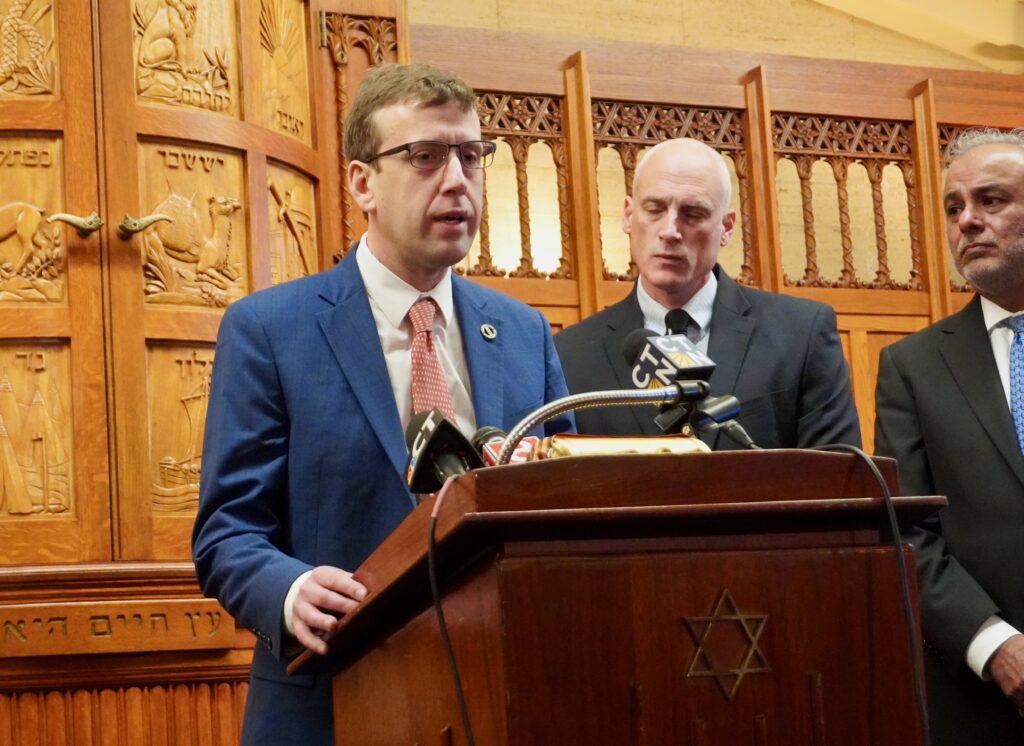
State Sen. Matt Lesser (D-Middletown) speaks at a press conference at Congregation Beth Israel regarding security grants for houses of worship and nonprofits on Dec. 14, 2023. Photo credit: Ronni Newton
DESPP will be making the grant funding decisions, and will conduct risk assessments, Slap said. “These funds are for organizations that are deemed at heightened risk of either a hate crime or a domestic terrorist incident,” he said, noting that the funds are for capital expenditures, not operating costs. DESPP will also consider what types of security measures are already in place, and whether a grant was previously awarded.
Waren said examples of improvements could be security cameras, ways to protect exteriors from vehicles, vestibules. “One of the most important areas for security is simply access control,” he said. Many facilities were not built for access control, and have architecture that includes a lot of glass, and multiple access points.
Affecting access control “makes all the difference,” Waren said, not just for protection from terrorist incidents.
“Every institution is having discussions internally,” Anwar said, and they need help. “Is this going to have 100% protection? There’s no 100% protection,” he said, but this is a move in the right direction and a way to make it a priority in partnership with the state.
“There’s no magic way to stop all hate crimes in the state,” Lesser added. “But houses of worship and community centers are uniquely vulnerable just because of the density … that’s why it’s right to prioritize them.”
Many houses of worship were built for open access, “to welcome people off the street,” said Slap. “That’s a key part of their message,” he said, and that’s a challenge. “I think there’s no question that it’s going to make people safer. It’s also going to make people feel safer,” he said, and there is benefit to that as well because fear is no way to live.
The awarding of funds should take no more than a few months, Slap said.
Like what you see here? Click here to subscribe to We-Ha’s newsletter so you’ll always be in the know about what’s happening in West Hartford! Click the blue button below to become a supporter of We-Ha.com and our efforts to continue producing quality journalism.



